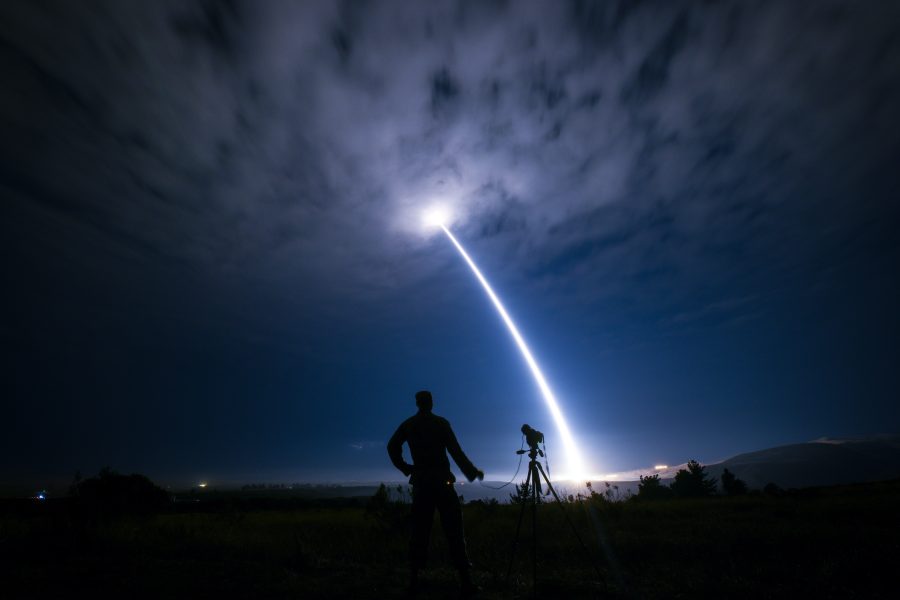The Air Force found no significant evidence of harmful chemicals at Vandenberg Space Force Base, Calif., as part of its ongoing Missile Community Cancer Study, the service said on April 22.
Samples collected in February found “no instances of contamination above regulatory action level.”
The sampling of Vandenberg focused on polychlorinated biphenyls (PCBs) and volatile organic compounds (VOCs), which are possible carcinogens. Three of the 116 PCB tests returned positive results—two at a Missile Alert Facility at the base and another at a Launch Facility. VOCs were detected in one sample.
However, the levels are low and “do not require mitigation efforts,” Air Force Global Strike Command said in a release.
The study, conducted by the U.S. Air Force School of Aerospace Medicine (USAFAM), was ordered by Gen. Thomas A. Bussiere in March 2023, in response to renewed concerns about the possibly hazardous conditions faced by missileers, who often sat on alert in underground bunkers in 24 to 48 hour shifts, as well as maintenance, security forces, and other Airmen who may also have been exposed to harmful chemicals at the missile sites.
The study originally focused on the three operational international continental ballistic missile bases Malmstrom Air Force Base, Mont.; F.E. Warren Air Force Base, Wyo.; and Minot Air Force Base, N.D. Together, those bases oversee 400 operational Minuteman III ICBM silos spread out over Montana, Wyoming, North Dakota, Colorado, and Nebraska. But as a test and training base, Vandenberg includes many of the same types of facilities. In fact, Vandenberg is the only base that actually launches Minuteman III missiles when the Air Force test-fires the Cold War-era missiles several times a year to ensure they are in working order. The Air Force announced they were expanding testing to the base in late 2023.
Vandenberg Space Force Base—formerly Vandenberg Air Force Base—hosts Air Force Global Strike Command’s 377th Test and Evaluation Group, which supports missile tests, and Air Education and Training Command’s 532nd Training Squadron, which provides missile training to roughly 450 missile officers and maintainers annually.
USAFAM, the study lead, conducted the environmental sampling. The team also tested for radon, a radioactive gas, but the Air Force is still waiting for the results of those samples.
Locations included “two Launch Facilities, one Missile Procedures Trainer, one operational Missile Alert Facility (MAF)/Launch Control Center (LCC), one deactivated Peacekeeper MAF/LCC, and missile maintenance trainers within the missile maintenance training bay,” AFGSC said.
PCBs have been found at operational bases above allowed levels, and the Air Force is working to clean them up. The chemicals were commonly used in electronics before being banned in the late 1970s. The positive samples at Vandenberg were found on one of the missile alert facilities’ launch control panels and on an electrical component in a launch facility. Vandenberg has served as a missile test facility since the late 1950s and continues to host numerous launches a year.

The Vandenberg sampling was less comprehensive than the three operational bases. In a release, Air Force Global Strike Command said that the study team did not test the soil, water, or organophosphates, despite contaminated soil and water being long-held concerns of missileers and being tested at operational bases. Unlike operational bases, the Air Force said Vandenberg’s location along the California coast is not near agricultural land, and the base gets its drinking water from an off-base municipal water system.
A separate part of the Missile Community Cancer Study found preliminary evidence showing higher rates of prostate and breast cancer for the missile community cohort, according to Department of Defense health data, but the study has not found higher rates of non-Hodgkin Lymphoma, a blood cancer. In early 2023, concerns from a Space Force officer who had served at Malmstrom surfaced online and sparked renewed interest in cases of non-Hodgkin Lymphoma.
The Air Force dismissed concerns of cancer among Airmen who served in missile fields in 2001 and 2005 studies that were far more limited in scope than the one now underway. Officials cautioned that the health data the service has evaluated is limited to information gathered from internal electronic DOD medical records and that the dataset will expand. Further results with more data are expected to be released this summer.
Lt. Gen. Michael J. Lutton, the deputy commander of AFGSC, said in a release that the service leaders are committed to a “comprehensive, science-based, transparent MCCS serving our nuclear force and families.”
